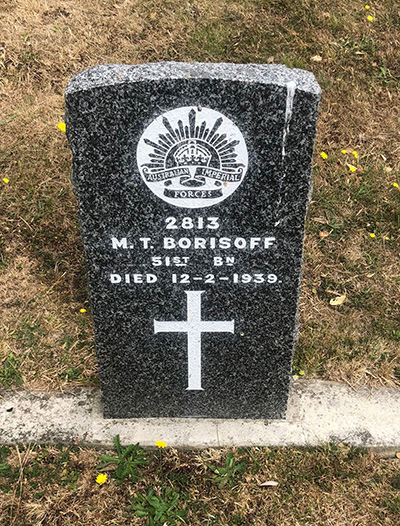Michael Theodoroff Borisoff
| Alias | served as Michael Stevens till 1.02.1917 |
|---|---|
| Russian spelling | Михаил Федорович Борисов |
| Born | 9.01.1889 |
| Place | Char-Navolok, Petrozavodsk, Olonetsk, Russia |
| Ethnic origin | Karelian / Russian |
| Religion | Russian Orthodox |
| Father | Theodor Pauloff Borisoff |
| Arrived at Australia |
from Vladivostok on 1911 per Apolda disembarked at Melbourne |
| Residence before enlistment | Geraldton, WA |
| Occupation | Labourer |
| Naturalisation | 1920 |
| Residence after the war | Fremantle, WA, 1923 visited Russia, 1923 Melbourne, 1930 Sydney, by 1934 New Zealand, 1934-1936 visit to Britain and, probably, Russia, since 1936 Wellington, Tawatapu, Pukerua, New Zealand |
| Died | 12.02.1939, Wellington, New Zealand |
Service #1
| Service number | 2813 |
|---|---|
| Enlisted | 14.08.1915 |
| Place of enlistment | Geraldton, WA |
| Unit | 28th Battalion, 51st Battalion |
| Rank | Private |
| Place | Western Front, 1916 |
| Casualties | WIA 1916 |
| Final fate | RTA 17.03.1917 |
| Discharged | 12.06.1917 MU |
Service #2 – Home service
| Enlisted | 19.09.1917 |
|---|---|
| Place of enlistment | Karra Ratta, WA |
| Rank | Private |
| Discharged | 19.10.1917 MU |
Materials
Digitised naturalisation (NAA)
Digitised service records (NAA)
Digitised appication to enlist (NAA)
Digitised Embarkation roll entry (AWM) (Michael Stevens)
Investigation branch file (NAA)
Alien registration file (NAA)
Blog article
Newspaper materials
Fatal injury. - Evening Post (Wellington, NZ), 17 February 1939, p.11
From Russian Anzacs in Australian History:
Most of the stories remain untold of those who attempted to return to Russia either permanently or just for a visit: sometimes all we have are a few unconnected facts, which allow us to surmise what their experiences were there. Michael Borisoff, a Karelian from Russia's northwest, was severely wounded at Mouquet Farm and spent many months hospitalised before being invalided to Australia, where he was in the home service for a while until his discharge from the army in October 1917. In June 1918, despite being discharged, he applied for a year's leave with free passage to Russia in the 'hope of recovery of my health': this was refused. In 1920 he was naturalised and when we next hear of him it is from an application dated October 1923. By now, he is resident at a Salvation Army aged men's retreat in Victoria, and not well. His application was for replacement medals; the reason he gave was that his own medals had been confiscated by Russian authorities 'upon leaving Russian detention barracks' in Chita (southwestern Siberia) in May 1923. One can only wonder what ordeals in Russia this sick man had survived -- how he had managed to escape from there.
Gallery

Karori Cemetery in Wellington, New Zealand
(Image courtesy of Paul FitzGerald)
 Russian Anzacs
Russian Anzacs